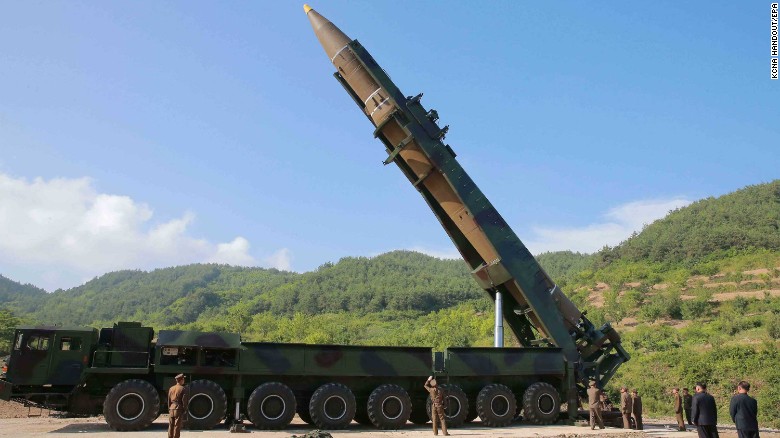On Tuesday morning, millions of people in northern Japan woke up to a government text alert warning that a ballistic missile test-fired from North Korea was passing overhead.
The missile was the first from Pyongyang to fly over Japan. Its flight lasted for two minutes before the projectile fell into the Pacific Ocean.
The launch of a North Korean missile towards Japan, a close ally of the United States, has further escalated tensions over leader Kim Jong-un‘s nuclear and ballistic weapons programs.
Japanese Prime Minister Shinzo Abe described the test as “reckless.” Following a 40-minute phone call with U.S. President Donald Trump on Tuesday, Mr. Abe said, “this launch of a North Korean missile is an unprecedented serious and grave threat to Japan.”
“For the first time since 1945, people in Tokyo, where I live, are feeling that we might be attacked by nuclear missile,” Ken Kato, director of Human Rights in Asia, told The Globe Post. “Japanese are mostly peace-loving, moderate and somewhat naïve people, but when the threat reaches a certain point, the whole society changes in a day. That happened a few times in our history.”
Given the short distance between Japan and North Korea, people don’t have much time to take cover in underground shelters or strong buildings in the event of an attack.
“It is obvious that if DPRK is seriously thinking about attacking Japan, Japan will not be able to defend [itself],” Dr. Tatsujiro Suzuki, director at the Research Center for Nuclear Weapons Abolition at Nagasaki University, told The Globe Post.
Dr. Suzuki added, “Many Japanese still trust American military strength (in particular ‘nuclear umbrella’) would deter DPRK to take military action.”
Pyongyang’s move also angered Mr. Trump, who warned on Tuesday that “all options are on the table” going forward.
In response to the missile test, the U.S. sent four advanced jet fighters and a pair of B-1B supersonic bombers over the Korean Peninsula in joint exercises with Japanese and South Korean air forces on Thursday.
The heightened military threat from North Korea also led to a new round of debate on whether Japan should acquire its own missiles, or even develop its own nuclear arms.
During the U.S. presidential election last year, Mr. Trump repeatedly suggested that Washington change its policy regarding Japan owning nuclear weapons. Washington has long maintained that the U.S. nuclear umbrella is adequate and prepared to defend Japan from an attack, provided Tokyo not develop its own nuclear weapons.
Mr. Kato said only conservatives in Japan are currently insisting Tokyo have nuclear weapons. “But if the threat from North Korea intensifies, I believe the majority of Japanese will support the idea. It is not difficult for Japan to develop nuclear weapons,” he said.
Tokyo has long taken a defensive military posture, and its armed forces are only for the sake of self-defense. Yet just two days after the missile test, Japan’s defense ministry is reportedly seeking a record $160 million in funding to add swift, longer-range missiles to its military arsenal.
Dr. Suzuki said public opinion in Japan may lean towards further nuclear reductions. “I don’t think DPRK threat will change Japanese public attitude towards nuclear power. In fact, because nuclear facilities could be potential targets of missile attack, some prefer to shut down existing plants as soon as possible or change the policy to restart the closed plant.”
It is clear that Japan is not Mr. Kim’s main target. Following Tuesday’s missile test, Mr. Kim made it clear that he plans “more ballistic rocket launching drills with the Pacific as a target,” according to North Korean state-run media reports.
The U.S. military demonstrated its ability to intercept a medium-range ballistic missile in the wake of North Korea’s launch. On Wednesday, the Navy and Missile Defense Agency tracked and shot down a test missile near Hawaii using a Standard Missile-6 interceptor missile.
“We will continue developing ballistic missile defense technologies to stay ahead of the threat as it evolves,” Missile Defense Agency Director Lt. Gen. Sam Greaves said.


